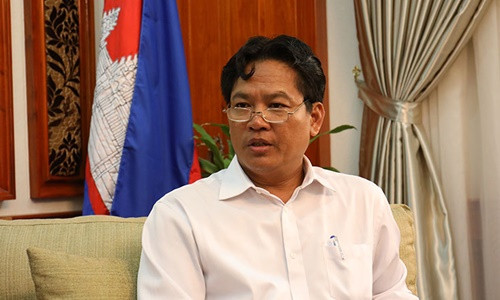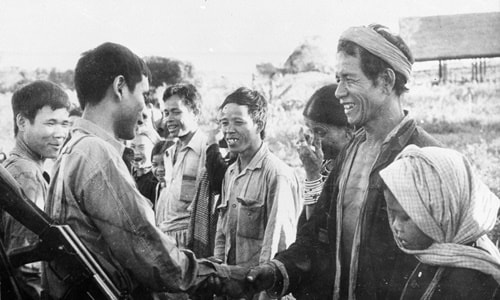Cambodian scholar: “Without Vietnam, we would all have died because of the Khmer Rouge”
Leading Cambodian scholar Sok Touch witnessed many Khmer Rouge crimes before the arrival of Vietnamese volunteers.
When civil war broke out in Cambodia in the 1970s after the overthrow of Prince Norodom Sihanouk's government, Sok Touch, then a five-year-old boy, ran with his father into the jungle, followingKhmer Times.
 |
| President of the Royal Academy of Cambodia Sok Touch. Photo: Khmertimeskh. |
Touch later became a child soldier in the brutal Khmer Rouge army. "I was asked to carry weapons. Like other boys, I was a victim of the regime," said Touch, who is now president of the Royal Academy of Cambodia (RAC).
Since taking power in 1975, the Khmer Rouge implemented policies of forced migration from urban areas to the countryside, torture, mass executions, and forced labor that led to malnutrition and disease across the country. Hundreds of thousands were sent to the Killing Fields, where they were executed and buried in mass graves. Children were abducted, indoctrinated, and used as tools to commit acts of violence. An estimated 1.8 million people died in the genocide carried out by the reactionary Pol Pot group.
Born in 1965, Touch said he only realized he served the Khmer Rouge when he became a teenager.
Since mid-1975, the Khmer Rouge began to launch numerous attacks on Vietnamese territory, destroying many border villages and killing tens of thousands of civilians, mostly the elderly, women and children, and burning tens of thousands of houses and people's properties. The crimes of the Khmer Rouge forced Vietnam to take self-defense and retaliatory actions, even though the country had just been at peace for a short time.
After crushing the Pol Pot group's invasion of the Southwestern border of Vietnam, at the request of the Cambodian revolution, Vietnamese volunteer troops came to help the Cambodian revolutionary armed forces liberate the nation from genocide, restore and build the country. On January 7, 1979, Vietnamese volunteer troops entered to liberate the capital Phnom Penh, and the Khmer Rouge remnants fled.
Although he was once a member of the Khmer Rouge, Touch always praised and defended the righteousness of the Vietnamese volunteer army in carrying out its international duty, helping the Cambodian people escape the genocide of Pol Pot.
"As a scholar, my clear message is that when the Vietnamese entered Cambodia in 1979, they rescued Cambodians from the Khmer Rouge regime. Without the intervention of Vietnamese troops, all of us would have been killed," Mr. Touch said, rejecting hostile allegations about the presence of Vietnamese volunteer troops on Cambodian soil.
In 1989, Vietnamese volunteer military units withdrew from Cambodia, after basically defeating the Khmer Rouge remnants, consolidating the revolutionary government for the neighboring country and fulfilling its international obligations.
 |
| People in Ratanakiri welcome Vietnamese volunteer soldiers and Cambodian revolutionary armed forces. Photo: VNA. |
This was also the time when Mr. Touch was sent to study in Russia and returned to Cambodia 10 years later. He held positions such as director of Khemarak University in Phnom Penh and head of the RAC Institute of International Relations for many years. In July 2015, Mr. Touch was assigned to lead a team of experts from RAC to support the demarcation and marker planting work on the Vietnam-Cambodia border.
Despite graduating with a degree in political history in Russia, Touch said he has no intention of becoming a politician. "I don't want to become a politician because I want academia to continue to develop," he said. "I can help politicians, but I don't want to become a politician."

